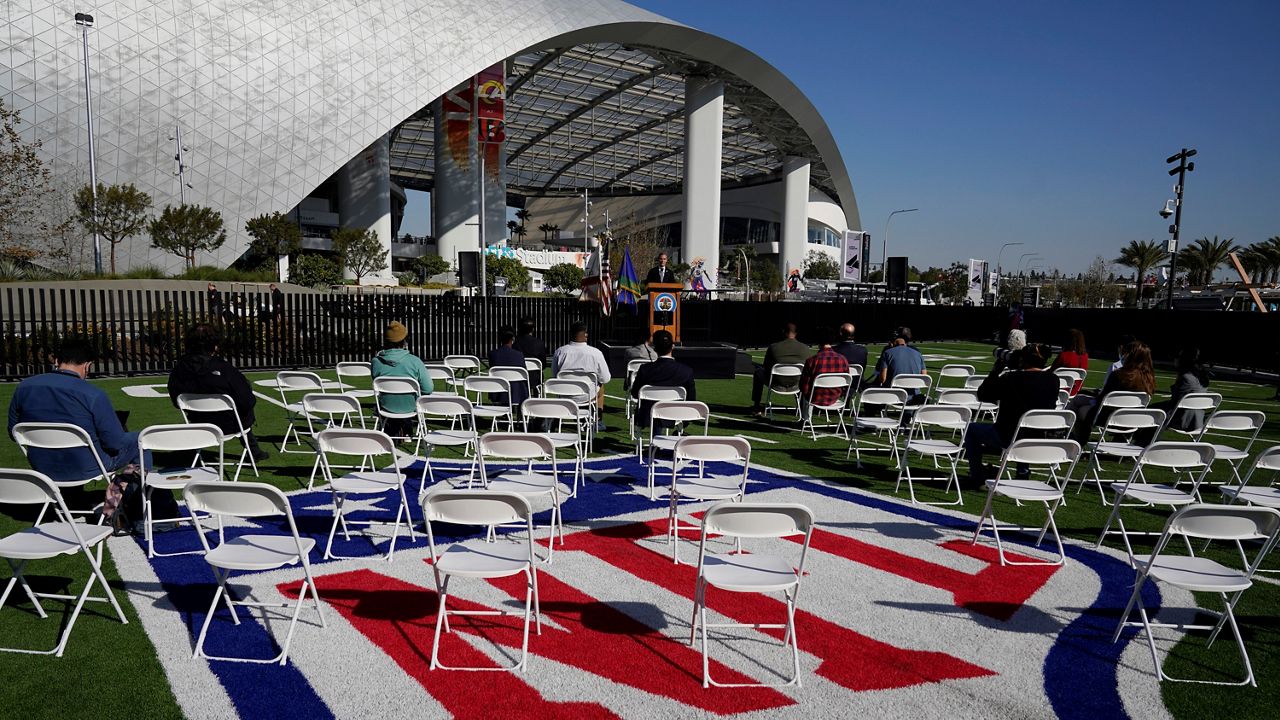INGLEWOOD, Calif. — When sports fans begin flocking to Los Angeles next week for the Super Bowl, they'll see how a multibillion-dollar football stadium development has transformed a neighborhood.
The Los Angeles Rams face the Cincinnati Bengals in Super Bowl LVI at SoFi Stadium in Inglewood.
Before Los Angeles Rams' owner Stan Kroenke placed a stake in Inglewood in 2014, the city had a perceived rough reputation. The Los Angeles Lakers and Kings were long gone from the Great Western Forum. The allure and the city's nickname 'City of Champions' had gone with it. At one point, the city was on the verge of bankruptcy.
The minority-majority city was more known as a blue-collar, hardworking town, said Odest Riley Jr., born and raised in the area.
"When the Lakers left, a lot of the infrastructure and investments left," said Riley Jr., the CEO and principal of WLM Financial, a private real estate firm in Inglewood. "It became pretty tough. There was a [negative] reputation with gangs and stuff like that."
But those days seem to be far behind.
These days, Inglewood's finances are on the upswing despite the coronavirus pandemic. It has become a hub of business investment and commercial real estate activity anchored by SoFi Stadium in recent years. Many people are now clamoring for a piece.
"The Super Bowl is a reintroduction to everybody that Inglewood is back," said Riley Jr. "There are so many people who have never visited the city, and they'll be able to see all of the lovely views, great weather, and the beautiful architecture."
The Super Bowl in Inglewood kicks off one of several significant events that the city is hosting in the coming years. The event highlights the amount of commercial development happening in the town to the tens of millions of viewers tuning into the game.
Kroenke, the Rams owner, personally invested more than $5 billion to build and develop Hollywood Park, a 298-acre mixed-use live, work, and play stadium and entertainment district.
While the stadium is complete, there's still work being done on new office buildings, retail stores, a hotel, restaurants and park space. Bad weather and the coronavirus pandemic slowed construction on some parts.
Last summer, Google, the parent company of YouTube, agreed to a naming rights deal with the Kroenke's group for YouTube Theater, a 6,000-seat entertainment arena next to SoFi Stadium.
Aside from the stadium, Los Angeles Clippers owner Steve Ballmer is building a mixed-use sports and entertainment district nearby.
Ballmer's company is investing more than $1.1 billion to build a brand new basketball arena, office building, a sports medicine clinic, retail and community space. Ballmer also added the Forum entertainment venue.
"They are building an infrastructure and a sports and entertainment district, so on any given day, there's always a reason to come here," said Riley Jr. "You can watch a concert at the Forum, a game at SoFi, or a comedian at the YouTube theater."
In the coming years, SoFi stadium will host several major events, including the College Football Playoff National Championship in 2023 and the opening and closing ceremonies of the 2028 summer Olympic games.
The mega-developments have helped shoot up the price of single-family homes in Inglewood. Housing real estate prices in the city had shot up 148%, from $298,044 in 2014, when Kroenke announced the stadium build, to $740,000 in Dec. 2021.
However, to truly become a live, work and play destination, one thing is missing — mass public transit.
"Anyone that has gone to a Rams [or Chargers] game there knows it's a traffic nightmare," said Tony Morales, an international director at JLL Los Angeles. "The master plan, the stadium, the quality of construction, the vision of retail, hotel, offices all are perfect. The biggest negative is traffic."
Morales said the traffic situation during game days or event days could impact companies' decisions to relocate and lease office space in the area.
"It has all the infrastructure but will it be a destination spot that creates its own submarket? That is to be determined," said Morales.
Last year, the city began exploring building an Automated People Mover that would connect to Metro's downtown Inglewood station and ferry people to and from SoFi Stadium, the Forum, and the Clippers new basketball stadium, the Daily Breeze reported.
Still, the Super Bowl coming to Inglewood cannot be overstated, said Roy Weinstein, the managing director of Micronomics, an economic research and consulting firm.
Weinstein, a member of the Advisory Board of the Los Angeles Sports and Entertainment Commission, said the Super Bowl's economic impact in Inglewood and Los Angeles ranges from $234 million to $477 million.
The big game, which draws nearly 100 million viewers around the world, will help drive future business and investments in the city in the years to come, he said.
"So-Fi Stadium and the Super Bowl will bring unprecedented exposure to Inglewood, surpassing even the greatness of the Great Western Forum days," said Weinstein to Spectrum News. "The identification of Inglewood with the most state-of-the-art football stadium in the world, along with views of the surrounding environs on Super Bowl Sunday, will generate new, ongoing interest in the area by both tourists and investors."



